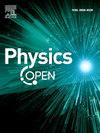卡坦量子计量学
IF 1.4
Q2 Physics and Astronomy
引用次数: 0
摘要
我们讨论了双量子比特门的特征,重点关注定义其Cartan分解的三个参数的联合估计的精度界限。我们推导出了最优的探测状态,这些状态可以最大限度地提高精度,最小化马虎度,并消除量子不相容。此外,我们分析了最优探针集的性质,并评估了它们对噪声的鲁棒性。本文章由计算机程序翻译,如有差异,请以英文原文为准。
Cartan quantum metrology
We address the characterization of two-qubit gates, focusing on bounds to precision in the joint estimation of the three parameters that define their Cartan decomposition. We derive the optimal probe states that jointly maximize precision, minimize sloppiness, and eliminate quantum incompatibility. Additionally, we analyze the properties of the set of optimal probes and evaluate their robustness against noise.
求助全文
通过发布文献求助,成功后即可免费获取论文全文。
去求助
来源期刊

Physics Open
Physics and Astronomy-Physics and Astronomy (all)
CiteScore
3.20
自引率
0.00%
发文量
19
审稿时长
9 weeks
 求助内容:
求助内容: 应助结果提醒方式:
应助结果提醒方式:


